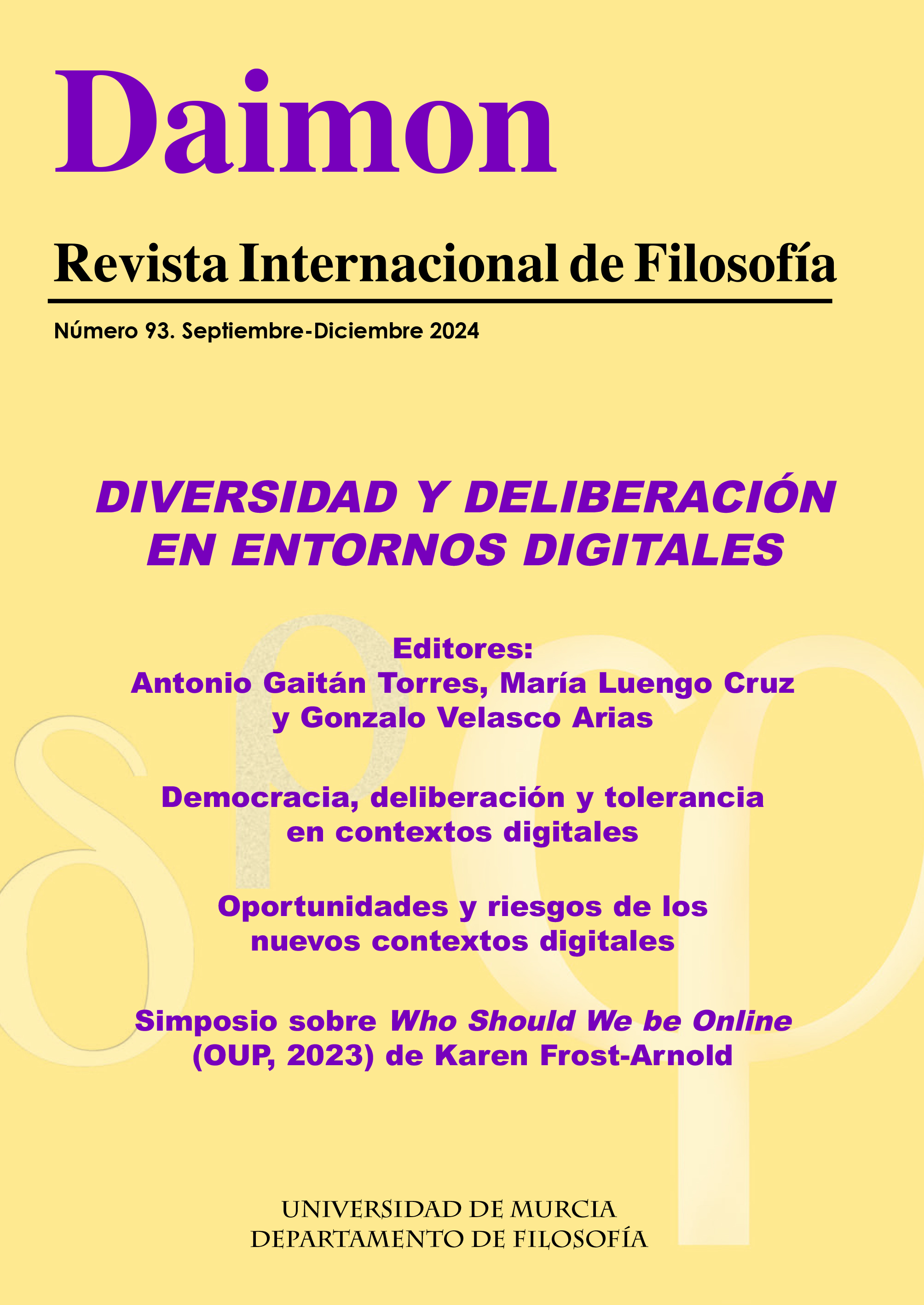Platformization, automation and acceleration in social media
Supporting Agencies
- Basque Government
Abstract
"Web 2.0" period raised several expectations about the potential of social media to renew and extend spaces for deliberation, discussion and political emancipation of citizenship. However, business concentration that followed the establishment of a few platforms as cultural intermediaries in the digital space has led to backlash from different fields. This essay presents the main problematics associated to social media for discussion and deliberation. In particular, three constituent factors are identified: platformization, automation and acceleration. It is argued that these factors present serious threats to the safeguard of democratic rights. The text also explores how the rising of generative artificial intelligence will reinforce and extend these threats.
Downloads
-
Abstract582
-
PDF (Español (España))287
-
HTML (Español (España))64
References
Bail, C. (2022). Breaking the social media prism: How to make our platforms less polarizing. Princeton University Press.
Echeverría, J. (1999). Los señores del aire: Telépolis y el tercer entorno. Destino.
Echeverría, J., & Almendros, L. S. (2023). Tecnopersonas: Cómo nos transforman las tecnologías. Ediciones Trea.
Floridi, L. (2014). The fourth revolution: How the infosphere is reshaping human reality. Oxford University Press.
Gillespie, T. (2018). Custodians of the Internet: Platforms, content moderation, and the hidden decisions that shape social media. Yale University Press.
Gillespie, T. (2010). The Politics of Platforms. New Media & Society, 12(3), 347–364. https://doi.org/10.1002/9781118321607.ch28
Gutiérrez, R. T. (2015). La Belleza del Código: Influencia de la Web 2.0, los medios sociales y los contenidos multimedia en el desarrollo de HTML5 [Universidad de Salamanca]. http://dsp.tecnalia.com/handle/11556/190
Helmond, A. (2015). The Platformization of the Web: Making Web Data Platform Ready. Social Media + Society, 1(2), 205630511560308. https://doi.org/10.1177/2056305115603080
Muirhead, R., & Rosenblum, N. L. (2019). A lot of people are saying: The new conspiracism and the assault on democracy. Princeton University Press.
Noble, S. U. (2018). Algorithms of oppression: How search engines reinforce racism. New York University Press.
O´Neill, C. (2017). Weapons of Math Destruction. How Big Data increases inequality and threatens democracy. Penguin Books.
Pariser, E. (2011a). The Filter Bubble. Penguin Books.
Pariser, E. (2011b). The filter bubble: What the Internet is hiding from you. Penguin Books.
Poell, T., Nieborg, D., & Duffy, B. E. (2021). Platforms and cultural production. Polity Press.
Roberts, S. T. (2019). Behind the screen. Yale University Press.
Shirky, C. (2008). Here comes everybody: The power of organizing without organizations. Penguin.
Srnicek, N. (2017). Platform Capitalism. Polity Press.
Sundararajan, A. (2016). The Sharing Economy. The MIT Press.
Surowiecki, J. (2005). The wisdom of crowds. Anchor.
Tabarés, R. (2018). Understanding the role of digital commons in the web; The making of HTML5. Telematics and Informatics, 35(5), 1438–1449. https://doi.org/10.1016/j.tele.2018.03.013
Tabarés, R. (2021). HTML5 and the evolution of HTML; tracing the origins of digital platforms. Technology in Society, 65. https://doi.org/https://doi.org/10.1016/j.techsoc.2021.101529
Tapscott, D., & Williams, A. D. (2006). Wikinomics: la nueva economía de las multitudes inteligentes. Paidos Ibérica.
Vaidhyanathan, S. (2018). Antisocial media: How Facebook disconnects us and undermines democracy. Oxford University Press.
van Dijck, J. (2013). The Culture of Connectivity: A Critical History of Social Media. Oxford University Press.
van Dijck, J., Poell, T., & Waal, M. de. (2018). The platform society: Public values in a connective world. Oxford University Press.
York, J. C. (2022). Silicon values: The future of free speech under surveillance capitalism. Verso.
Copyright (c) 2024 Daimon Revista Internacional de Filosofia

This work is licensed under a Creative Commons Attribution-NonCommercial-NoDerivatives 3.0 Unported License.
Las obras que se publican en esta revista están sujetas a los siguientes términos:
1. El Servicio de Publicaciones de la Universidad de Murcia (la editorial) conserva los derechos patrimoniales (copyright) de las obras publicadas, y favorece y permite la reutilización de las mismas bajo la licencia de uso indicada en el punto 2.
2. Las obras se publican en la edición electrónica de la revista bajo una licencia Creative Commons Reconocimiento-NoComercial-SinObraDerivada 3.0 España (texto legal). Se pueden copiar, usar, difundir, transmitir y exponer públicamente, siempre que: i) se cite la autoría y la fuente original de su publicación (revista, editorial y URL de la obra); ii) no se usen para fines comerciales; iii) si remezcla, transforma o crea a partir del material, no podrá distribuir el material modificado.
3. Condiciones de auto-archivo. Se permite y se anima a los autores a difundir electrónicamente las versiones pre-print (versión antes de ser evaluada) y/o post-print (versión evaluada y aceptada para su publicación) de sus obras antes de su publicación, ya que favorece su circulación y difusión más temprana y con ello un posible aumento en su citación y alcance entre la comunidad académica. Color RoMEO: verde.











